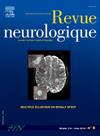冲动控制障碍:回顾临床、药物和遗传风险因素。
IF 2.3
4区 医学
Q2 CLINICAL NEUROLOGY
引用次数: 0
摘要
简介帕金森病(PD)是一种神经退行性疾病,以运动和非运动症状为特征,其中冲动控制障碍行为(ICD)是重要的非运动表现。帕金森病患者的冲动控制障碍行为(ICD)包括病态赌博、性欲亢进、强迫性购买等,会导致严重的身体损害和生活质量下降。本综述旨在探讨与帕金森病患者ICD相关的多方面风险因素,包括临床、药理学和遗传学方面,以加强早期识别、预防和管理策略:方法:我们对文献进行了全面回顾,以确定调查帕金森病 ICD 危险因素的研究。对临床、药理学和遗传学研究的数据进行了分析,以阐明导致 ICD 发生的各种因素之间复杂的相互作用:结果:年轻、男性和特定人格特征等临床风险因素始终与较高的 ICD 发生率相关。文化差异和地理位置等环境因素影响着 ICD 的发病率。疾病特征包括帕金森病发病早、病程长、运动波动、焦虑、抑郁、睡眠障碍和冷漠。药物风险因素涉及多巴胺能药物,多巴胺激动剂与 ICD 呈剂量依赖关系。遗传风险因素强调了多巴胺能系统和血清素能系统的参与,并与各种神经递质通路有关:结论:ICD在帕金森病中是一种常见且严重的疾病。了解帕金森病 ICD 的多方面风险因素对于识别高危患者和制定有针对性的干预措施以防止其发生至关重要。考虑到 ICD 的发生频率以及对患者及其家庭的潜在影响,目前的策略是在患者随访过程中系统筛查 ICD,尤其是在处方多巴胺受体激动剂时。本文章由计算机程序翻译,如有差异,请以英文原文为准。
Impulse control disorder: Review on clinical, pharmacologic, and genetic risk factors
Introduction
Parkinson's disease (PD) is a neurodegenerative disorder characterized by motor and non-motor symptoms, among which impulse control disorders behaviors (ICD) emerge as significant non-motor manifestations. ICD in PD patients, including pathological gambling, hypersexuality, compulsive buying, among others, lead to considerable impairment and reduced quality of life. This review aims to explore the multifaceted risk factors associated with ICD in PD patients, including clinical, pharmacological, and genetic aspects, to enhance early identification, prevention, and management strategies.
Methods
A comprehensive review of literature was conducted to identify studies investigating risk factors for ICD in PD. Data from clinical, pharmacological, and genetic studies were analyzed to elucidate the complex interplay of factors contributing to ICD development.
Results
Clinical risk factors such as young age, male gender, and specific personality traits were consistently associated with a higher incidence of ICD. Environmental factors such as cultural nuances and geographic location influence ICD prevalence. Disease characteristics include early PD onset, longer disease duration, motor fluctuations, anxiety, depression, sleep disorders, and apathy. Pharmaceutical risk factors involve dopaminergic drugs, with dopamine agonists showing a dose-dependent association with ICD. Genetic risk factors highlight the involvement of dopaminergic and serotoninergic systems, with various neurotransmitter pathways implicated.
Conclusions
ICDs are common and severe in PD. Understanding the multifaceted risk factors for ICD in PD is crucial for identifying patients at high risk to develop these adverse effects and developing targeted interventions to prevent their occurrence. Given their frequency and potential consequences for the patient and their family, the current strategy is to systematically screen for ICDs throughout patient follow-up, particularly when prescribing dopamine agonists.
求助全文
通过发布文献求助,成功后即可免费获取论文全文。
去求助
来源期刊

Revue neurologique
医学-临床神经学
CiteScore
4.80
自引率
0.00%
发文量
598
审稿时长
55 days
期刊介绍:
The first issue of the Revue Neurologique, featuring an original article by Jean-Martin Charcot, was published on February 28th, 1893. Six years later, the French Society of Neurology (SFN) adopted this journal as its official publication in the year of its foundation, 1899.
The Revue Neurologique was published throughout the 20th century without interruption and is indexed in all international databases (including Current Contents, Pubmed, Scopus). Ten annual issues provide original peer-reviewed clinical and research articles, and review articles giving up-to-date insights in all areas of neurology. The Revue Neurologique also publishes guidelines and recommendations.
The Revue Neurologique publishes original articles, brief reports, general reviews, editorials, and letters to the editor as well as correspondence concerning articles previously published in the journal in the correspondence column.
 求助内容:
求助内容: 应助结果提醒方式:
应助结果提醒方式:


